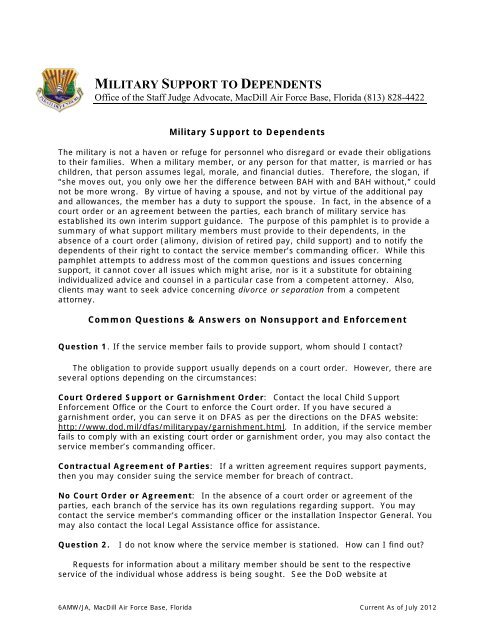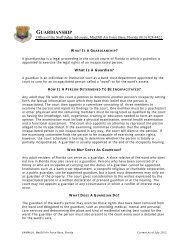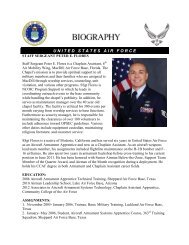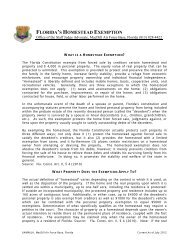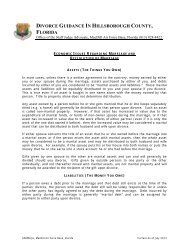MILITARY SUPPORT TO DEPENDENTS - MacDill Air Force Base
MILITARY SUPPORT TO DEPENDENTS - MacDill Air Force Base
MILITARY SUPPORT TO DEPENDENTS - MacDill Air Force Base
Create successful ePaper yourself
Turn your PDF publications into a flip-book with our unique Google optimized e-Paper software.
<strong>MILITARY</strong> <strong>SUPPORT</strong> <strong>TO</strong> <strong>DEPENDENTS</strong><br />
Office of the Staff Judge Advocate, <strong>MacDill</strong> <strong>Air</strong> <strong>Force</strong> <strong>Base</strong>, Florida (813) 828-4422<br />
Military Support to Dependents<br />
The military is not a haven or refuge for personnel who disregard or evade their obligations<br />
to their families. When a military member, or any person for that matter, is married or has<br />
children, that person assumes legal, morale, and financial duties. Therefore, the slogan, if<br />
“she moves out, you only owe her the difference between BAH with and BAH without,” could<br />
not be more wrong. By virtue of having a spouse, and not by virtue of the additional pay<br />
and allowances, the member has a duty to support the spouse. In fact, in the absence of a<br />
court order or an agreement between the parties, each branch of military service has<br />
established its own interim support guidance. The purpose of this pamphlet is to provide a<br />
summary of what support military members must provide to their dependents, in the<br />
absence of a court order (alimony, division of retired pay, child support) and to notify the<br />
dependents of their right to contact the service member’s commanding officer. While this<br />
pamphlet attempts to address most of the common questions and issues concerning<br />
support, it cannot cover all issues which might arise, nor is it a substitute for obtaining<br />
individualized advice and counsel in a particular case from a competent attorney. Also,<br />
clients may want to seek advice concerning divorce or separation from a competent<br />
attorney.<br />
Common Questions & Answers on Nonsupport and Enforcement<br />
Question 1. If the service member fails to provide support, whom should I contact?<br />
The obligation to provide support usually depends on a court order. However, there are<br />
several options depending on the circumstances:<br />
Court Ordered Support or Garnishment Order: Contact the local Child Support<br />
Enforcement Office or the Court to enforce the Court order. If you have secured a<br />
garnishment order, you can serve it on DFAS as per the directions on the DFAS website:<br />
http://www.dod.mil/dfas/militarypay/garnishment.html. In addition, if the service member<br />
fails to comply with an existing court order or garnishment order, you may also contact the<br />
service member’s commanding officer.<br />
Contractual Agreement of Parties: If a written agreement requires support payments,<br />
then you may consider suing the service member for breach of contract.<br />
No Court Order or Agreement: In the absence of a court order or agreement of the<br />
parties, each branch of the service has its own regulations regarding support. You may<br />
contact the service member’s commanding officer or the installation Inspector General. You<br />
may also contact the local Legal Assistance office for assistance.<br />
Question 2. I do not know where the service member is stationed. How can I find out?<br />
Requests for information about a military member should be sent to the respective<br />
service of the individual whose address is being sought. See the DoD website at<br />
6AMW/JA, <strong>MacDill</strong> <strong>Air</strong> <strong>Force</strong> <strong>Base</strong>, Florida Current As of July 2012
http://www.defense.gov/faq/pis/pc04mltr.html for additional details on who to contact to<br />
get this information. However, if you contact individual installations to determine whether<br />
the member is stationed there, you will not succeed. Typically, that information is closely<br />
held for privacy and security reasons. Therefore, the best procedure is writing a letter to<br />
the correct military locator service.<br />
Question 3. What information should be contained in a letter to the commanding officer?<br />
You should include your name and the names of the service member’s other<br />
dependents, the name of the service member, rank, the last four of SSN if known, and the<br />
amount of support in cash or in kind that the member is paying, if any. You should also<br />
attach any pertinent documents such as marriage certificate, birth certificates, last LES,<br />
military orders, and any bills that you have.<br />
Question 4. What does support include?<br />
A service member would be credited for not only cash support, but also in kind support.<br />
For example, support includes payments for certain essentials such as rent, mortgage,<br />
property insurance, child care payments, etc.<br />
Question 5. What do the service regulations state concerning mandatory support?<br />
The Army, Navy, Marines, <strong>Air</strong> <strong>Force</strong>, and Coast Guard are each governed by different<br />
regulations as follows:<br />
ARMY<br />
The Department of the Army sets minimum support requirements. See AR 608-99, FAMILY<br />
<strong>SUPPORT</strong>, CHILD CUS<strong>TO</strong>DY, AND PATERNITY (2003) found at<br />
http://armypubs.army.mil/epubs/pdf/R608_99.PDF. Soldiers are expected to comply with<br />
the following:<br />
1. Financial support provisions of a court order or financial support provisions of a written<br />
agreement in the absence of a court order.<br />
2. Minimal support requirements in the absence of a court order or written agreement are<br />
outlined in the table below for a solider receiving credit for payment of rent, utilities,<br />
mortgage, interest due on loans, and real property insurance payments.<br />
Situation<br />
Family unit not in gov<br />
housing<br />
Family unit in gov housing<br />
Family members within the<br />
family unit residing at<br />
different locations<br />
Single-family units<br />
BAH II–WITH<br />
Level of Support<br />
no support unless supported family member(s) move(s) out<br />
of gov housing, then the soldier will provide BAH II–WITH<br />
pro-rata share of BAH II–WITH to each family member not<br />
residing in gov housing<br />
No additional support for family members residing in gov<br />
housing.<br />
6AMW/JA, <strong>MacDill</strong> <strong>Air</strong> <strong>Force</strong> <strong>Base</strong>, Florida Current As of July 2012
Soldier married to another<br />
person on active duty in<br />
any service<br />
no support unless required by court order or by agreement<br />
Single-family unit where Soldier married to active duty spouse but with children<br />
from marriage or prior marriage<br />
soldier does not have BAH–DIFF to the military member having custody of the child<br />
custody of any children and or children<br />
the children do not reside in<br />
gov quarters<br />
soldier does not have no additional support<br />
custody of any children and<br />
the children reside in gov<br />
quarters<br />
soldier has custody of one<br />
or more children<br />
no support for a child or the children in the custody of the<br />
other military member<br />
Multiple family units<br />
Family members in gov<br />
housing<br />
no additional support<br />
Each family member not in<br />
gov housing<br />
pro-rata share of BAH II–WITH<br />
A pro-rata share = 1/(Total number of supported family members) X BAH II-WITH<br />
NAVY<br />
Navy requirements for support are found in 32 C.F.R. §733.3 found at<br />
http://www.gpoaccess.gov/cfr/retrieve.html. The Navy requires a member to comply with a<br />
court order or agreement between the parties. 32 C.F.R. §. 733.3. If there is no agreement<br />
or court order, then the following guidelines are to be used:<br />
Situation<br />
Spouse only<br />
Spouse and one minor child<br />
Spouse and two or more<br />
children<br />
One minor child<br />
Two minor children<br />
Three minor children<br />
Level of Support<br />
one third (1/3) of gross pay<br />
one half (1/2) of gross pay<br />
three fifths (3/5) of gross pay<br />
one sixth (1/6) of gross pay<br />
one fourth (1/4) of gross pay<br />
one third (1/3) of gross pay<br />
The above chart is a guideline and is “not intended as a fixed rule” and “actual support may<br />
be increased or decreased as the facts and circumstances warrant.” 32 C.F.R. §733.3(a)(2).<br />
Gross pay includes basic pay and BAH, but not hazardous duty pay, sea or foreign duty pay,<br />
incentive pay, or basic allowance for subsistence pay. See 32 C.F.R. §733.3(b)(2).<br />
6AMW/JA, <strong>MacDill</strong> <strong>Air</strong> <strong>Force</strong> <strong>Base</strong>, Florida Current As of July 2012
MARINE CORPS<br />
Marine Corps requirements for dependent support are found in MCO P5800.16A, Ch. 15,<br />
found at<br />
http://www.usmc.mil/news/publications/Documents/MCO%20P5800.16A%20CH%201-<br />
5.pdf. In the absence of a court order or agreement, interim support per supported family<br />
member shall be the greater of the fixed amount of support reflected in the center column<br />
ofthe chart below, or the pro-rated share of whatever BAH or OHA(Overseas Housing<br />
Allowance) to which the Marine is currently entitled, as shown in the chart below, per<br />
month. Note that BAH that is credited to the Marine for government housing, but is not<br />
actually paid in cash and is not counted for purposes of this chapter. Under no<br />
circumstances shall the total amount of support required exceed 1/3 of the Marine’s gross<br />
military pay, per month. For purposes of this order, gross military pay is defined as the total<br />
of all military pay and allowances before taxes or any other deductions. The amount<br />
calculated under the chart below is presumed to be the correct amount of support to be paid<br />
to a family member.<br />
Total Number of<br />
Family Members<br />
Entitled to Support<br />
Minimum Amount<br />
Of Monthly Support<br />
per Requesting<br />
Family Member<br />
Share of Monthly<br />
BAH/OHA per<br />
Requesting Family<br />
Member<br />
1 $350 1/2<br />
2 $286 1/3<br />
3 $233 1/4<br />
4 $200 1/5<br />
5 $174 1/6<br />
6 or more $152 1/7 or etc.<br />
See MCO P5800.16A, Ch. 15 for the Support Calculation Worsheet.<br />
AIR FORCE<br />
The <strong>Air</strong> <strong>Force</strong>, unlike the sister services, does not provide specific quantities of support<br />
owing to family members. Instead, <strong>Air</strong> <strong>Force</strong> policy regarding support provides that each<br />
<strong>Air</strong> <strong>Force</strong> member is expected to “provide adequate financial support to family members.”<br />
AFI 36-2906, PERSONAL FINANCIAL RESPONSIBILITY (1998) para 3.2.1 found at http://www.epublishing.af.mil/shared/media/epubs/AFI36-2906.pdf.<br />
Members must “provide adequate<br />
financial support of a spouse or child or any other relative for which the member receives<br />
additional allowances for support. Members will also comply with the financial support<br />
provisions of a court order or written support agreement. AFI 36-2906, para 7.2. Upon<br />
receipt of a complaint of non-support by a family member, the member will be required to<br />
prove financial support and the member may not receive BAQ at the with-dependent rate if<br />
not providing financial support to their spouse or children or the <strong>Air</strong> <strong>Force</strong> may recoup the<br />
BAQ for periods of non-support. AFI 36-2906, para 3.2.3. In addition, DFAS will cooperate<br />
with the family member to implement involuntary collection of support through garnishment<br />
or statutory allotments.<br />
COAST GUARD<br />
The Coast Guard has established the following support requirements in the absence of a<br />
court order:<br />
6AMW/JA, <strong>MacDill</strong> <strong>Air</strong> <strong>Force</strong> <strong>Base</strong>, Florida Current As of July 2012
Situation<br />
Spouse Only<br />
Spouse and one minor or handicapped child<br />
Spouse and two or more minor or<br />
handicapped children<br />
One minor or handicapped child<br />
Two minor or handicapped children<br />
Three or more minor or handicapped<br />
children<br />
Level of Support<br />
BAH DIFF plus 20% of basic pay<br />
BAH DIFF plus 25% of basic pay<br />
BAH DIFF plus 30% of basic pay<br />
16.7% (1/6) of basic pay<br />
25% (1/4) of basic pay<br />
33% (1/3) of basic pay<br />
See COAST GUARD PERSONNEL MANUAL Section 8.M.3. (CIM 1000.64 1998) found at<br />
http://www.uscg.mil/directives/cim/1000-1999/CIM_1000_6A.pdf. For this scale, BAH<br />
DIFF is defined as the difference between the BAH with dependents rate and the BAH<br />
without dependents rate as calculated for the member.<br />
Conclusion<br />
Each servicemember owes financial support to his/her dependents. In the<br />
absence of a court order or agreement of the parties, the military departments<br />
mandate that the member provide support. This support can be waived in certain<br />
limited circumstances such as abuse or desertion, but generally the military<br />
responds to valid claims of non-support. Again, this pamphlet is not a substitute<br />
for obtaining competent legal advice and representation in each specific case.<br />
The material in this handout represents general legal advice. The law is continually<br />
changing; although the information in the handout was current as of the date it was drafted,<br />
some provisions in this pamphlet may have changed. It is always best to consult an<br />
attorney about your legal rights and responsibilities regarding your particular case.<br />
6AMW/JA, <strong>MacDill</strong> <strong>Air</strong> <strong>Force</strong> <strong>Base</strong>, Florida Current As of July 2012


